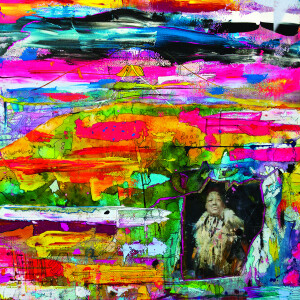 The Medicine Singers’ self-titled debut release is yet another mind-blowing musical project out of Indian Country. This year of 2022 seems to be the year for them! Although this one includes some guest vocals from Joe Rainey, a Red Lake Ojibwe whose debut recording Niineta I reviewed earlier this year, it mainly features members of the Eastern Medicine Singers, most or all of whom are from the Wampanoag Tribe and related tribes of the Eastern Algonquin in the Northeastern U.S. This project also features some collaborators from the New York-area non-Indigenous experimental music scene, chiefly Yonatan Gat, the Israeli-born New York experimental musician and composer best known for his band Monotonix. Also on hand is multi-instrumentalist Thor Harris, trumpeter jaimie branch, reed player Matt Bauder, and a couple of large handfuls of people who produce, program, and play a host of synthesizers and keyboards.
The Medicine Singers’ self-titled debut release is yet another mind-blowing musical project out of Indian Country. This year of 2022 seems to be the year for them! Although this one includes some guest vocals from Joe Rainey, a Red Lake Ojibwe whose debut recording Niineta I reviewed earlier this year, it mainly features members of the Eastern Medicine Singers, most or all of whom are from the Wampanoag Tribe and related tribes of the Eastern Algonquin in the Northeastern U.S. This project also features some collaborators from the New York-area non-Indigenous experimental music scene, chiefly Yonatan Gat, the Israeli-born New York experimental musician and composer best known for his band Monotonix. Also on hand is multi-instrumentalist Thor Harris, trumpeter jaimie branch, reed player Matt Bauder, and a couple of large handfuls of people who produce, program, and play a host of synthesizers and keyboards.
They call themselves simply Medicine Singers to differentiate themselves from the more traditional style of powwow drumming and singing performed by the Eastern Medicine Singers. And the focus is definitely on the powwow drumming and singing. Where in Rainey’s recording the drumming was implied, here it shares center stage with the singing. The drummers don’t receive any named credits, but the lead vocals are shared mostly by Eastern Medicine Singers founder Daryl Black Eagle Jamieson, Ian Wapichana, and Red Medicine, with appearances by Rainey and a couple of other singers.
Make no mistake, this is highly experimental music. The electronics are fully integrated into the experience, often playing just as big a role as the vocals and drumming. Ditto for Gat’s wildly creative improvisational electric guitar playing. Gat’s playing usually assumes a support role, except in the one cover song here, the 1958 instrumental “Rumble” by surf guitar pioneer Link Wray, who was of Shawnee heritage. “I’m not a Shawnee, but I can relate to their struggle,” Jamieson ways. “Link Wray put the pain of his people into the music. For me, it was an honor to expand this song, and bring out the tribal aspects with the drum and singing we added. The vocal intro to ‘Rumble’ is called ‘Sunrise,’ an ancient song that’s been around forever.”
Ian Wapichana uses his lovely high falsetto to great effect on the album’s bookends, “A Cry” and “Reprise of a Cry.” The opener is a soft, lulling song with gentle contributions from guitar, bass, horn and synths; the closer has more of an ambient country sound: reverb-laden electric guitar, languid trumpet, Thor Harris’s hypnotic marimba drone, and Wapichana’s soaring falsetto vocals; in the outro we get thrumming electronics and highly distorted Joe Rainey vocals.
In between are eight tracks that bring synthesizers, production techniques, and a variety of instruments into play with the powwow-type drumming and singing. Jamieson’s voice is front and center on “Daybreak” and it reminds me a bit of Los Lobos’ Cesar Rosas, in both timbre and soulfulness. “Hawk Song” is a pretty straightforward powwow song, Raymond Two Hawks Watson singing lead over the drumming and vocals of the Eastern Medicine Singers, Gat’s wild guitar improv, and a variety of electronics including the Russian-made Lyra 8 synthesizer, an unusual and powerful instrument.
The two longest tracks are pivot points on the album. Ian Wapichana again takes lead on “Sanctuary,” which has more subtle drumming from just two drummers, but the sound is augmented by tons of synth droning and some jazz-influenced soloing on trumpet and bass clarinet, both of which are backed by electronic piano sounds from both Wurlitzer and Rhodes keyboards. Gat has a guitar solo that soars but doesn’t showboat, and the piece rises to a roaring storm of electronic noise that ends abruptly. “Sunset” is similarly complex, featuring a trumpet solo intro from jaimie branch and the album’s catchiest melody that sounds kind of like a sea chantey, with Red Medicine on lead vocals. Gat plays both pipe organ and surf guitar, on which he eventually plays a wild solo over lots of electronic noise and singing.
As with Joe Rainey’s album, Daryl Black Eagle Jamieson acknowledges that traditionalists might object to this blend of Indigenous and non-Indigenous sounds, instruments and techniques. He’s not having it, though. “A symphony orchestra can have a folk singer come and do a piece with them. It’s no different for us. This is experimental art. We’re showing people experimental art from the Eastern Algonquin side of the world.”
One dollar from each Stone Tapes album sale will go toward a charity of the artist’s choice. For Medicine Singers, the funds will go to Jamieson’s organization Pocasset Pocanoket Land Trust.
(Stone Tapes / Joyful Noise, 2022)
Medicine Singers online:
Instagram | Facebook | Bandcamp
